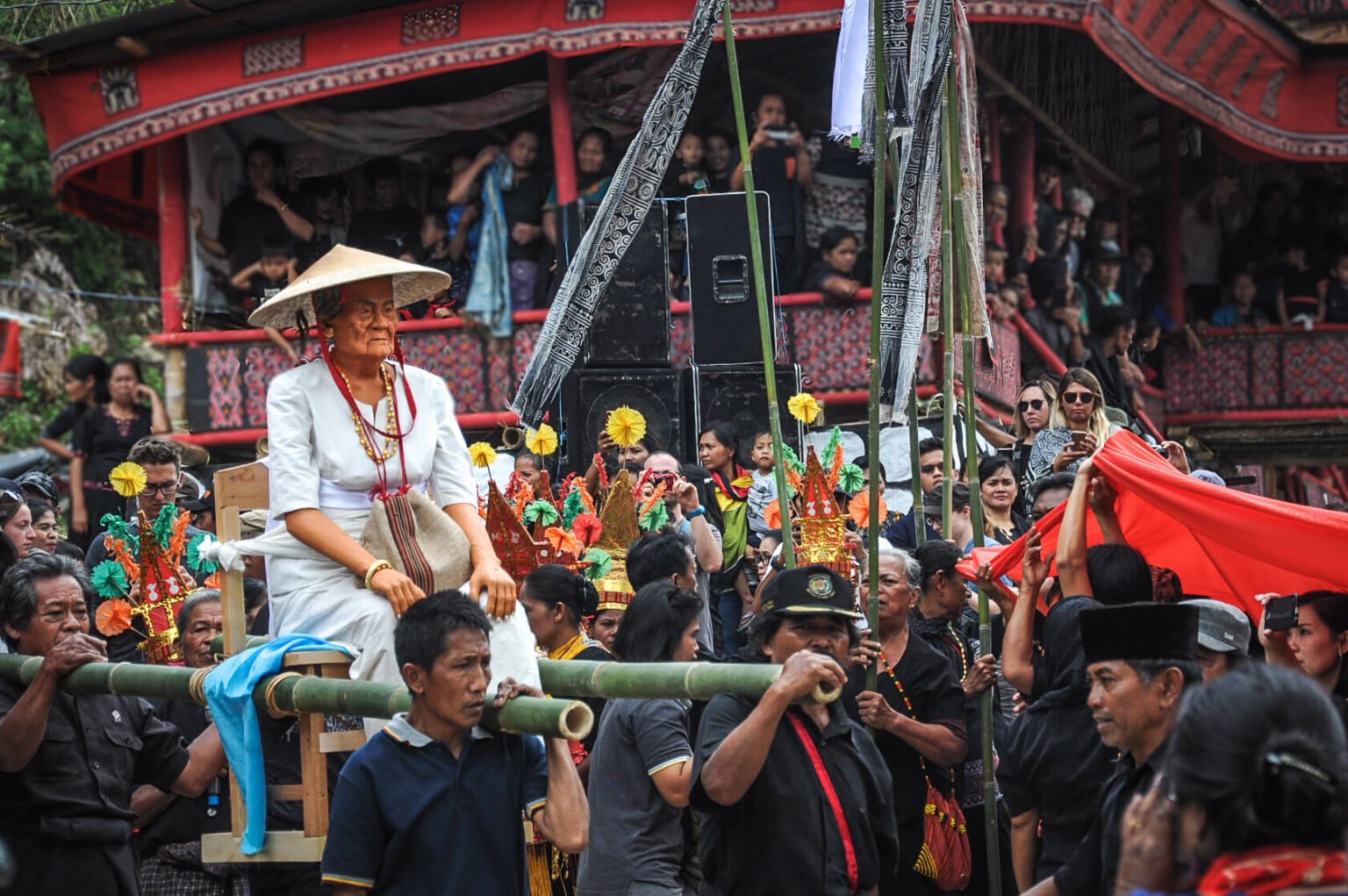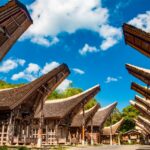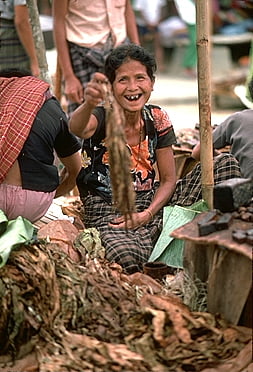There are three main types of affiliation in Toraja society: family, class and religion.
Family Affiliation
Family is the primary social and political grouping in Torajan society. Each village is one extended family, the seat of which is the tongkonan, a traditional Torajan house. Each tongkonan has a name, which becomes the name of the village. The familial dons maintain village unity. Marriage between distant cousins (fourth cousins and beyond) is a common practice that strengthens kinship. Toraja society prohibits marriage between close cousins (up to and including the third cousin) except for nobles, to prevent the dispersal of property. Kinship is actively reciprocal, meaning that the extended family helps each other farm, share buffalo rituals, and pay off debts.

Each person belongs to both the mother’s and the father’s families, the only bilateral family line in Indonesia.[18] Children, therefore, inherit household affiliation from both mother and father, including land and even family debts. Children’s names are given on the basis of kinship, and are usually chosen after dead relatives. Names of aunts, uncles and cousins are commonly referred to in the names of mothers, fathers and siblings.
Before the start of the formal administration of Toraja villages by the Tana Toraja Regency, each Toraja village was autonomous. In a more complex situation, in which one Toraja family could not handle their problems alone, several villages formed a group; sometimes, villages would unite against other villages. Relationship between families was expressed through blood, marriage, and shared ancestral houses (tongkonan), practically signed by the exchange of water buffalo and pigs on ritual occasions. Such exchanges not only built political and cultural ties between families but defined each person’s place in a social hierarchy: who poured palm wine, who wrapped a corpse and prepared offerings, where each person could or could not sit, what dishes should be used or avoided, and even what piece of meat constituted one’s share.
Class affiliation
In early Toraja society, family relationships were tied closely to social class. There were three strata: nobles, commoners, and slaves (slavery was abolished in 1909 by the Dutch East Indies government). Class was inherited through the mother. It was taboo, therefore, to marry “down” with a woman of lower class. On the other hand, marrying a woman of higher class could improve the status of the next generation. The nobility’s condescending attitude toward the commoners is still maintained today for reasons of family prestige.
Nobles, who were believed to be direct descendants of the descended person from heaven, lived in tongkonans, while commoners lived in less lavish houses (bamboo shacks called banua). Slaves lived in small huts, which had to be built around their owner’s tongkonan. Commoners might marry anyone, but nobles preferred to marry in-family to maintain their status. Sometimes nobles married Bugis or Makassarese nobles. Commoners and slaves were prohibited from having death feasts. Despite close kinship and status inheritance, there was some social mobility, as marriage or change in wealth could affect an individual’s status. Wealth was counted by the ownership of water buffaloes.
Slaves in Toraja society were family property. Sometimes Torajans decided to become slaves when they incurred a debt, pledging to work as payment. Slaves could be taken during wars, and slave trading was common. Slaves could buy their freedom, but their children still inherited slave status. Slaves were prohibited from wearing bronze or gold, carving their houses, eating from the same dishes as their owners, or having sex with free women a crime punishable by death.
Religious Affiliation
Toraja’s indigenous belief system is polytheistic animism, called aluk, or “the way” (sometimes translated as “the law”). In the Toraja myth, the ancestors of Torajan people came down from heaven using stairs, which were then used by the Torajans as a communication medium with Puang Matua, the Creator. The cosmos, according to aluk, is divided into the upper world (heaven), the world of man (earth), and the underworld. At first, heaven and earth were married, then there was a darkness, a separation, and finally the light. Animals live in the underworld, which is represented by rectangular space enclosed by pillars, the earth is for mankind, and the heaven world is located above, covered with a saddle-shaped roof. Other Toraja gods include Pong Banggai di Rante (god of Earth), Indo’ Ongon-Ongon (a goddess who can cause earthquakes), Pong Lalondong (god of death), and Indo’ Belo Tumbang (goddess of medicine); there are many more.
The earthly authority, whose words and actions should be cleaved to both in life (agriculture) and death (funerals), is called to minaa (an aluk priest). Aluk is not just a belief system; it is a combination of law, religion, and habit. Aluk governs social life, agricultural practices, and ancestral rituals. The details of aluk may vary from one village to another. One common law is the requirement that death and life rituals be separated. Torajans believe that performing death rituals might ruin their corpses if combined with life rituals. The two rituals are equally important.
The decline of the Toraja religion began with the Christianization under rule of the Dutch. During the time of the Dutch missionaries, Christian Torajans were prohibited from attending or performing life rituals, but were allowed to perform death rituals.[14] Consequently, Toraja’s death rituals are still practised today, while life rituals have diminished. The traditional Toraja religion is today only practiced by a small minority.











